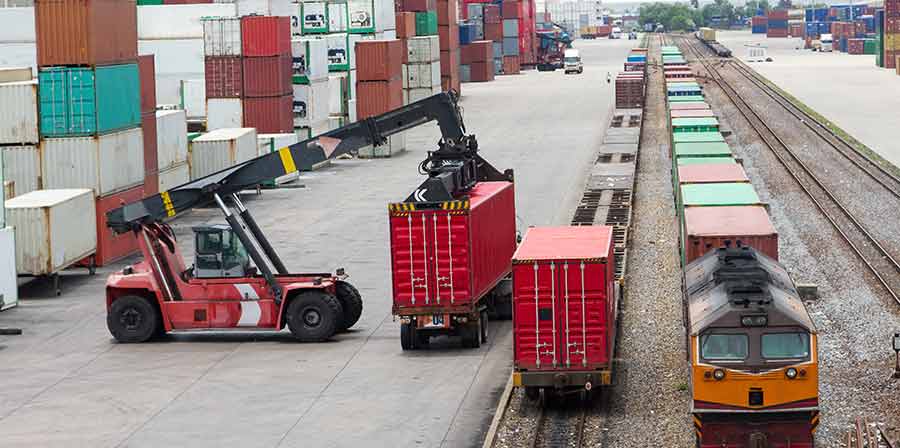Today, the necessity of moving products both effectively and in a budget-friendly manner is more important than ever before. Intermodal shipping, a method that combines different modes of transportation to move freight seamlessly, is at the forefront of this logistical revolution. Entering 2024, grasping the complexities and benefits of intermodal shipping is essential for companies aiming to refine and enhance their supply chain operations. This article explores the essence of intermodal shipping, its evolving role in global trade, and how leveraging this method can provide strategic benefits for businesses. Additionally, we will uncover how Jillamy, a leader in third-party logistics, is pioneering innovative solutions to elevate intermodal shipping, offering insights into harnessing its full potential for your business needs.
Intermodal Shipping 101
Welcome to the world of intermodal shipping, where efficiency meets versatility! It goes beyond simply transporting items; it's about transporting them more intelligently. So, what exactly is intermodal shipping? Let's break it down:
The Basics of Intermodal Shipping
- Definition: Intermodal shipping involves moving merchandise in a unified container or vehicle across various transportation methods, like rail, sea, and road, without directly handling the cargo during transitions. Picture it as a relay race where the baton, representing your goods, seamlessly passes from one transportation method to the next.
- The Process: It typically starts with goods being packed into large containers. These containers are trucked to a rail or ship terminal. Next, they're loaded onto a rail car or a ship, traveling long distances. Finally, at the destination terminal, they're transferred back onto trucks for final delivery.
Historical Perspective and Evolution
- Origins: The concept dates back to the 18th century, but modern intermodal shipping took off after World War II, thanks to the standardization of shipping containers by Malcolm McLean in the 1950s.
- Technological Advancements: Over the years, advancements in technology have streamlined this process. Innovations like GPS tracking, automated cranes, and sophisticated logistics software have revolutionized how we track and manage intermodal shipments.
Importance in the Global Logistics Landscape:
- Efficiency and Scale: It's a cornerstone in global trade, offering a balance of speed and cost, especially over long distances. The capacity to transport large volumes of goods with efficiency has rendered intermodal shipping an essential component of modern logistics.
- Flexibility: Intermodal shipping offers flexibility in terms of cargo size, types, and destinations. Whether it’s consumer goods, electronics, or raw materials, it handles a diverse range of cargo.
- Environmental Impact: It’s also greener. For example, trains outperform trucks in fuel efficiency, capable of transporting a ton of cargo for almost 500 miles using just one gallon of fuel. This reduces the carbon footprint significantly compared to road-only transport. Find out more on how to reduce carbon emission with an optimal intermodal shipping strategy in our recent article here.
Intermodal Shipping in 2024:
- Current Trends: In 2024, we're seeing a surge in its popularity, driven by global economic shifts and a growing emphasis on sustainable practices.
- Innovation and Growth: The integration of AI and IoT for better tracking and route optimization, along with more eco-friendly practices, is setting new standards in the logistics industry.
Intermodal shipping transcends being merely a technique; it's a dynamic ecosystem that continually adjusts to the shifting requirements of international commerce. It's the lifeline of international commerce, connecting continents, and delivering goods efficiently and sustainably.
The Benefits of Intermodal Shipping
In their quest for streamlined and eco-friendly supply chain operations, companies are increasingly turning to intermodal shipping as a key strategy. This transportation method, which seamlessly combines rail, road, and sea transport, offers a multitude of benefits. Let's delve into these advantages, which are crucial for companies looking to optimize their logistics operations in the modern marketplace.
Cost-Effectiveness: A Strategic Advantage
- Reduced Transportation Costs: One of the most compelling advantages of intermodal shipping is its cost-effectiveness. Utilizing the strengths of each transportation mode, often results in lower overall costs compared to single-mode shipping. Rail transport, for instance, is more fuel-efficient than road transport for long distances, leading to significant savings in fuel costs.
- Economies of Scale: The use of standardized shipping containers allows for the movement of large quantities of goods, achieving economies of scale. This uniformity also streamlines the loading and unloading process, reducing labor costs and minimizing the likelihood of cargo damage.
Environmental Sustainability: A Commitment to the Future
- Reduced Carbon Footprint: The environmental benefits of intermodal shipping are substantial. By relying more on rail — a mode of transport that has a lower carbon footprint than road transport — businesses can significantly reduce their greenhouse gas emissions. This transition gains significance against the backdrop of escalating environmental regulations and the worldwide movement towards sustainable practices.
- Energy Efficiency: Rail and sea transport are inherently more energy-efficient than trucking. This efficiency not only cuts costs but also aligns with the growing corporate responsibility to engage in eco-friendly practices.
Reliability and Safety: Ensuring Cargo Integrity
- Predictable Schedules: Rail transport, a key component of intermodal shipping, offers the advantage of fixed schedules and routes. This predictability enhances planning accuracy and helps maintain consistent supply chain timelines.
- Enhanced Security: The sealed nature of intermodal containers, coupled with reduced handling, minimizes the risk of theft and damage. Railroads also tend to have lower accident rates compared to road transport, adding an extra layer of security for shipped goods.
Responding to Modern Logistics Challenges
In 2024, the logistics landscape faces unique challenges, from fluctuating fuel prices to global trade uncertainties. With its inherent flexibility and scalability, Intermodal shipping offers a resilient solution. This approach allows companies to adjust to evolving market scenarios, maintaining both the continuity and effectiveness of their supply chain operations.
While industries maneuver through the intricacies of international commerce, strategically embracing intermodal shipping is becoming ever more crucial. Its blend of cost efficiency, environmental sustainability, and reliable transportation positions it as a cornerstone of modern logistics. For businesses aiming to thrive in today's competitive environment, leveraging the power of intermodal shipping is not just an option; it's a necessity.
Innovative Strategies and Creative Applications of Intermodal Shipping in 2024
Intermodal shipping presents a variety of tactics for businesses to boost both their efficiency and competitive edge. As we drive forward into 2024, let’s explore how companies can creatively and effectively leverage intermodal shipping, harnessing its full potential in this rapidly evolving landscape.
Leveraging Technology for Enhanced Efficiency
- Digital Integration and IoT: The integration of digital technologies is revolutionizing intermodal logistics. The Internet of Things (IoT) enables real-time tracking and monitoring of shipments, providing unprecedented visibility into the supply chain. Sensors on containers can relay information about location, temperature, and even the condition of goods, facilitating proactive management of shipments.
- AI and Predictive Analytics: Artificial intelligence (AI) and predictive analytics are becoming instrumental in optimizing routes and predicting potential disruptions. By analyzing vast amounts of data, these technologies can forecast delays due to weather, congestion, or maintenance, allowing for preemptive rerouting and ensuring timely deliveries.
Customized Solutions for Diverse Industries
- Retail Sector: In retail, where timing and inventory management are crucial, intermodal shipping offers a balanced solution. Seasonal demand spikes, for instance, can be managed more effectively by combining the speed of truck transport with the cost-efficiency of rail for bulk movements.
- Manufacturing and Heavy Industry: For the manufacturing sector, especially heavy industries, intermodal shipping provides a reliable way to transport large, heavy goods. Utilizing rail for long distances minimizes the risk of road damage and accidents, while still ensuring flexibility and accessibility via trucking for the first and last miles.
Sustainability as a Competitive Edge
- Eco-Friendly Practices: As sustainability becomes a core component of corporate strategy, intermodal shipping offers an environmentally friendly alternative. By reducing reliance on truck transport, companies can significantly lower their carbon emissions, aligning with global sustainability goals and improving their brand image.
- Renewable Energy Integration: The movement towards adopting renewable energy in transportation is similarly shaping the landscape of intermodal logistics. Rail operators are increasingly adopting biofuels and electrification, setting new standards for eco-conscious shipping.
Adapting to Global Trade Dynamics
- Resilience in Supply Chains: The fluctuating landscape of global trade, marked by political uncertainties and economic shifts, calls for adaptable logistics strategies. Intermodal shipping, with its inherent flexibility, allows businesses to quickly adjust routes and modes of transport in response to changing international trade policies and market conditions.
- Collaborative Logistics Networks: The future of intermodal shipping also lies in collaborative logistics. By partnering with other businesses to consolidate shipments, companies can achieve cost savings, improve efficiency, and reduce their environmental impact.
The landscape of intermodal shipping in 2024 is one of opportunity and innovation. By embracing new technologies, tailoring solutions to industry needs, prioritizing sustainability, and adapting to global trends, businesses can not only enhance their logistics operations but also position themselves as forward-thinking leaders in their respective fields. Intermodal shipping, thus, is not just a logistics choice; it is a strategic tool that propels businesses into a more efficient, sustainable, and connected future.
How Jillamy Elevates Your Intermodal Shipping Game
In the intricate dance of intermodal shipping, Jillamy emerges as a choreographer of efficiency and innovation. Our approach to intermodal logistics is designed to streamline your supply chain with a suite of tailored solutions.
- Customized Logistics Solutions: At Jillamy, we understand that one size doesn't fit all. Our logistics solutions are designed to meet your unique business requirements, ensuring both flexibility and efficiency.
- Advanced Technology Integration: Leveraging cutting-edge technologies, we offer enhanced visibility and control over your shipments. From real-time tracking with IoT to route optimization using AI, we bring the future of logistics to your doorstep.
- Sustainability Focus: Embracing eco-friendly practices, we help you reduce your carbon footprint, aligning with global sustainability goals while maintaining cost-effectiveness and reliability.
- Collaborative Approach: Our collaborative network expands your reach, offering seamless connectivity across various transportation modes, ensuring that your goods move smoothly, from origin to destination.
It's evident that the essence of intermodal shipping extends beyond mere transportation of goods; it encompasses intelligent, sustainable, and efficient movement. Jillamy's foundational principles of innovation, adaptability, and ecological responsibility resonate deeply with the progressive demands of contemporary enterprises. By partnering with us, you’re not just choosing a logistics service; you’re opting for a partner who understands the intricacies of global trade and the importance of adapting to its ever-changing landscape. With Jillamy, your logistics become more than a necessity; they become a strategic advantage, driving your business forward in an increasingly competitive world.
Ready to transform your logistics strategy and harness the full potential of intermodal shipping? Let Jillamy be your guide in this journey. Contact us today at 800-592-7449 or submit your request online, and let’s collaborate to create a logistics solution that not only meets your needs but also propels your business into a future of efficiency and growth.



